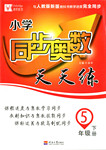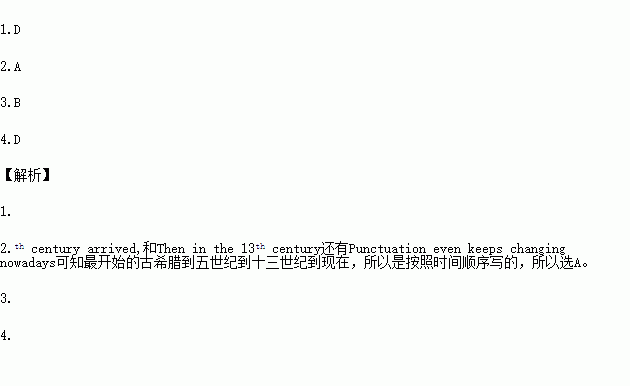题目内容
Every one of us gets so used to punctuation marks that not many of us give them a second thought. Actually, the ancient Greeks wrote this way. The lack of punctuation marks probably didn’t bother good readers, though. As they read, they just put pauses where they fit best. Also at this time, sentences switched directions. A sentence read from left to right. The next one read right to left, and then left to right again, etc. The ancient Romans sometimes punctuated like this: They put something that can separate words in a sentence. The word punctuation actually comes from this idea and the Latin word punctum, which means a dot.
When the 5th century arrived, there were just two punctuation marks: spaces and points. The spaces separated words while the points showed pauses in reading. Then in the 13th century, a printer named Aldus Manutius tried to standardize punctuation. He always used a period for a complete stop at the end of a sentence. He used a slash (/) to indicate a short pause. Over time, that slash was shortened and curled, and it became the modern comma (逗号).
Since that time, other marks have enlarged the punctuation family. The exclamation mark (感叹号) comes from the Latin word io. It means “exclamation of joy.” The question mark originally started out as the Latin word questio, meaning question. Eventually, scholars put it at the end of a sentence to show a question.
Punctuation even keeps changing nowadays. New marks are coming into existence, and old punctuation marks are used in new ways. Take for example the “interrobang”. This 1962 invention combines the question mark and exclamation mark for times when writers want both. For example, “She did what?” or “How much did you pay for that dress?” Obviously, the interrobang is not widely used or recognized yet, but its invention shows that English is not yet finished with its punctuation.
1.From the first paragraph, we can know that _______.
A. good readers had trouble reading without punctuation marks
B. a sentence always read from left to right in ancient Greece
C. ancient Greeks switched the direction of punctuation marks
D. the use of punctuation marks can date back to ancient times
2.The passage is developed _______.
A. by time B. by space
C. by comparison D. by importance
3.We can learn from the passage that _______.
A. ancient Romans didn’t use any punctuation marks
B. exclamation and question marks came from Latin
C. spaces and slashes were already used before the 5th century
D. Aldus Manutius first started to use commas
4.What can be concluded from the last paragraph?
A. The combination of two marks will not work.
B. It takes time for people to accept new punctuation marks.
C. Old punctuation marks need to be standardized.
D. Punctuation marks are still changing today.
 同步奥数系列答案
同步奥数系列答案
